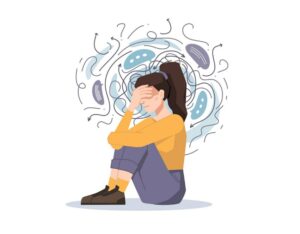Anxiety disorders are the most common mental illness in the United States, affecting 40 million adults in the country. While there are many different types of anxiety disorders, one of the most common is functional anxiety. This type of anxiety disorder can be very debilitating and can keep you from living a normal life. In this blog post, we will discuss what functional anxiety is, and how you can overcome it!
Contents
What Is Functioning Anxiety?
 Functional anxiety is a term used to describe the feeling of anxiety that many people experience on a daily basis. It is often described as a low-level feeling of anxiousness or unease that can be hard to pinpoint the cause of. This is a type of anxiety that can be manageable and doesn’t always require professional help to overcome.
Functional anxiety is a term used to describe the feeling of anxiety that many people experience on a daily basis. It is often described as a low-level feeling of anxiousness or unease that can be hard to pinpoint the cause of. This is a type of anxiety that can be manageable and doesn’t always require professional help to overcome.
However, in some cases, functioning anxiety can be more severe and have a more significant impact on your life. According to studies, anxiety disorders are the most common mental illness in the United States, affecting 40 million adults. And of those affected by anxiety, around 20% also suffer from depression.
Functioning anxiety can be caused by a number of factors, including genetics, brain chemistry, and life experiences. It can also be triggered by events or situations so you should not avoid or ignore it. If you’re struggling with functional anxiety, there are a few things you can do to help manage it.
What Are The Signs To Look For?
While recognizing functioning anxiety is not an easy task, there are certain signs and symptoms to look for. Individuals who suffer from functioning anxiety often:
- Feel as if they have to be “on” all the time
- Are unable to relax or take a break
- Constantly worry about what could go wrong
- Experience physical symptoms such as headaches, insomnia, or gastrointestinal issues
If you identify with any of these signs, it’s important to seek professional help. A therapist can assist you in learning how to manage your anxiety and live a more balanced life.
But you should remember, the symptoms are not limited to the ones mentioned above. If you are constantly feeling overwhelmed or stressed, it’s a good idea to reach out for help. They can provide you the accurate evaluation and treatment.
Is Functioning Anxiety Related To Functioning ADHD?
 Many people with anxiety disorders also have ADHD. In fact, research suggests that as many as 60 percent of adults with ADHD also have an anxiety disorder. While the two conditions share some symptoms, they are distinct disorders with different causes and treatment options.
Many people with anxiety disorders also have ADHD. In fact, research suggests that as many as 60 percent of adults with ADHD also have an anxiety disorder. While the two conditions share some symptoms, they are distinct disorders with different causes and treatment options.
Functioning anxiety is a type of anxiety that can cause significant impairment in daily life activities. People with functioning anxiety often have difficulty concentrating, sleeping, and completing tasks. They may also avoid situations that trigger their anxiety. Functioning anxiety is different from a general anxiety disorder in that it is more severe and interferes with daily life activities.
But yes, ADHD functioning and anxiety functioning are often linked in that people with ADHD tend to have higher levels of anxiety. And this can impact their productivity as well. But there are treatments that can help. If you think you might have functioning anxiety, talk to your doctor or mental health professional. They can help you find the right treatment for your specific situation.
What Triggers Functioning Anxiety?
There are a number of things that can trigger functioning anxiety. Some of these include:
A challenging situation at work
It is not uncommon for people to experience anxiety at work. This can be triggered by a number of things because at work we are constantly under pressure to perform. For example, if you are working on a project that is due soon, you may start to feel anxious about meeting the deadline.
An upcoming event
Another common trigger for anxiety is an upcoming event. This could be something as simple as a party or a meeting. The thought of having to interact with other people can be very overwhelming and cause anxiety.
A looming family conflict
It can also be a trigger for physical symptoms like a racing heart, sweating, and difficulty breathing. A looming family conflict causes people to worry about the future and what could happen. This can lead to feeling overwhelmed and stressed out.
Financial insecurity
Sometimes, functioning anxiety is caused by financial insecurity. If you’re constantly worried about money, it can be tough to focus on anything else. In fact, this can be a major cause of anxiety for many people.
These are just a few examples. But whatever the trigger, functioning anxiety can have a profound impact on your life. Additionally, some risk factors can make you more susceptible to developing this condition. These might include:
- A family history of anxiety or other mental health conditions
- Stressful life events, such as a divorce or the death of a loved one
- Abuse or trauma
- Certain medical conditions, such as thyroid problems or heart disease
- Low self-esteem and confidence
Fortunately, there are treatments available that can help you manage your anxiety and live a more normal life. With the right help, you can overcome functional anxiety and lead a happier, healthier life. If you think you might be suffering from this condition, talk to your doctor or mental health professional today!
Is It Normal To Have High-Functioning Anxiety?
 Yes, it is normal to have high-functioning anxiety. In fact, many people with anxiety are highly functional. However, just because it’s normal doesn’t mean it’s not a problem. If you have high-functioning anxiety, you may be able to manage your symptoms and live a relatively normal life.
Yes, it is normal to have high-functioning anxiety. In fact, many people with anxiety are highly functional. However, just because it’s normal doesn’t mean it’s not a problem. If you have high-functioning anxiety, you may be able to manage your symptoms and live a relatively normal life.
But that doesn’t mean it’s easy. People with high-functioning anxiety often feel like they’re not good enough, no matter how hard they try. They may also have difficulty relaxing and sleeping, and they may be constantly on edge. For example, you may have a hard time relaxing even when you’re not under stress.
All in all, you need to understand that though it is normal to have high-functioning anxiety, it can still be a problem. If you’re struggling to manage your anxiety, don’t hesitate to reach out for help. A therapist can teach you how to cope with your symptoms and live a more enjoyable life.
How Does It Impact Life?
There are many ways that functional anxiety can impact a person’s life. It can sometimes be positive and help motivate a person to get things done, but it can also be negative and cause a person to feel overwhelmed and stressed. Let’s discuss both of these impacts in more detail.
Positive impacts
Some of the positive aspects of functional anxiety may include:
- Helping a person to be more productive
- Giving a person a sense of purpose
- Encouraging a person to take action
These are actually all great things! And, in some cases, functional anxiety can be beneficial. But it’s important to remember that it can also have negative impacts.
Negative impacts
On the other hand, some of the negative aspects of functional anxiety may include:
- Making a person feel overwhelmed
- Causing a person to procrastinate
- Leading to poor decision-making
- Affecting a person’s quality of sleep
- Resulting in absenteeism from work or school
- Generating feelings of hopelessness and helplessness
If you’re struggling with functional anxiety, know that you’re not alone. Millions of people around the world live with this type of anxiety every day. The good news is that there are things you can do to ease your symptoms and regain control of your life.
How Do I Get Rid Of Functioning Anxiety?
 Functioning anxiety can be extremely debilitating. It can make it difficult to concentrate, eat, or even sleep. The good news is that there are a number of things you can do to manage your anxiety and get rid of it for good.
Functioning anxiety can be extremely debilitating. It can make it difficult to concentrate, eat, or even sleep. The good news is that there are a number of things you can do to manage your anxiety and get rid of it for good.
Here are some tips on how to get rid of functioning anxiety:
- Talk to someone who understands: One of the best things you can do is talk to someone who understands what you’re going through. This could be a friend, family member, therapist, or anyone else who can offer support and understanding.
- Identify your triggers: Try to identify what it is that triggers your anxiety. Once you know what your triggers are, you can start to work on avoiding them or managing them better.
- Create a plan: Once you know what your triggers are, it’s time to create a plan of action. This could involve things like deep breathing exercises, relaxation techniques, or positive self-talk.
- Maintain a healthy lifestyle: It is important to maintain a healthy lifestyle if you want to manage your anxiety. This means eating a balanced diet, getting enough sleep, and exercising regularly.
- Seek professional help: If you find that your anxiety is too much to handle on your own, don’t hesitate to seek professional help. A therapist can help you develop coping mechanisms and provide support.
Functioning anxiety can be a difficult thing to deal with, but it is possible to overcome it. By talking to someone who understands, identifying your triggers, and creating a plan of action, you can start to manage your anxiety and get rid of it for good.
If you find that your anxiety is too much to handle on your own, don’t hesitate to seek professional help. A therapist can help you develop coping mechanisms and provide support. With the right help, you can overcome functioning anxiety and live a happy, healthy life.
Conclusion
To conclude, functioning anxiety is anxiety that doesn’t stop you from going about your day-to-day activities, but instead manifests itself in more subtle ways. These can include feeling tense all the time, having racing thoughts, or being easily overwhelmed by stress. However, there are things that you can do to ease your functional anxiety.
These include exercises like yoga and meditation, journaling, and talking to a therapist. If you find that your anxiety is starting to impact your life in more serious ways, it’s important to seek professional help. But with some self-care and effort, you can definitely start to feel better.
For more information and guidance please get in touch with our expert therapists at Therapy Mantra. They will be more than happy to assist you on your journey to recovery. Contact us today to learn more about our services. You can also book an online therapy session or download our free Android or iOS app.


